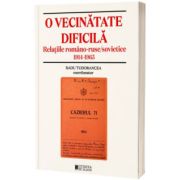Ipostazele - ajutorului fratesc - RPR si razboiul din Coreea de Radu Tudorancea

DESCRIERE
Cartea autorului Radu Tudorancea „Ipostazele - ajutorului fratesc - RPR si razboiul din Coreea de Radu Tudorancea" de la editura EIKON
Intr-o perioada in care evolutiile recente din RPD Coreeana starnesc neliniste si ingrijorare atat in cazul unor key-players regionali (precum Coreea de Sud sau Japonia), dar si in randul democratiilor occidentale, analiza unor etape-cheie (precum perioada razboiului din Coreea) ale background-ului politic al regimului de la Phenian, dar si a conexiunilor existente intre acesta si alte state ce apartineau taberei „democratiilor populare”, se constituie intr-o tema de cercetare de actualitate, care poate oferi indicii sau raspunsuri in legatura cu evenimente recente sau decizii asumate in cadrul mecanismului de putere de la Phenian.
Autorul
Radu Tudorancea has written an important, completely new, and fascinating study of Romanian connections with the Korean War. The earliest studies of the Korean War focused on the war’s causes, thought in the West to have been plotted by Joseph Stalin to expand the area of communism. Much attention was paid to the American response of going to the United Nations, taking advantage of a Soviet boycott of the UN to push through resolutions authorizing a forceful military response to Kim Il-sung’s invasion of the south. Then there was General Douglas MacArthur’s brilliant, if dangerous, amphibious landing at Inchon, which drove the North Koreans back across the border, the subsequent temptations to reject the original goal of containment and instead to move north and unite Korea, MacArthur’s foolish discounting of possible Chinese intervention, the Chinese drive to the south, MacArthur’s insubordination and ultimate firing, and the final military stalemate mostly just north of the original 38th parallel that marke the division of the Korean peninsula. Much attention was paid to the lengthy negotiations, the contentious issue of how to deal with the forcible repatriation of prisoners of war, whether President Eisenhower’s threat of a nuclear attack on China contributed to the war’s resolution, and what impact the death of Stalin had on the negotiations.
Kenton Clymer, Distinguished Research Professor Northern Illinois University, USA, Member of the Center for Southeast Asian Studies
Anul aparitiei: 2014
Format: 16 X 23
Numar pagini: 320








OPINIA CITITORILOR